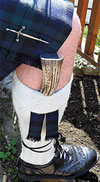Last week I went to Denbigh, a small town in the north east of Wales, to sing in a concert. On the way there there was some discussion about the origins and meaning of the name Denbigh. So I thought I’d find out more. The English name of the town doesn’t mean anything, but the Welsh name, Dinbych, means ‘small fortress’ – din is an old word for fort or castle related to the word dinas (fort; refuge; city), and bych is a variant form of bach (small). Related words include dinasfraint (citzenship), dinasol (civic, municipal), and dinaswr (citizen).
Din comes from the same root as the Irish dún (fort), the Scottish Gaelic dùn (fortress, heap), the Manx doon (fort, fastness, stronghold, bastion, earth fort, dun, fortified rock), and din (fortress) in Breton and Cornish – the Proto-Celtic *dūnom (stronghold) [source], which is cognate with the Proto-Germanic *tunaz/*tunan (fortified place), the root of the Old English tuun/tūn (an enclosure; farmstead; village; estate), from which we get the word town; and of the Dutch tuin (garden), and the German Zaun (fence, hedge).
The element -dunum in Gaulish/Latin places names, such as Lugdunum (Lyon) and Acitodunum (Ahun), comes from the same root, as does the element -ton in English places names such as Workington, Ulverston, Dalton and Warton.
The root of all these words is the PIE *dhu-no- (enclosed, fortified place, hill-fort), from *dheue- (to close, finish, come full circle) [source].
Here’s a Glossary of Welsh Place-Name Elements, and a Key to English places names.
